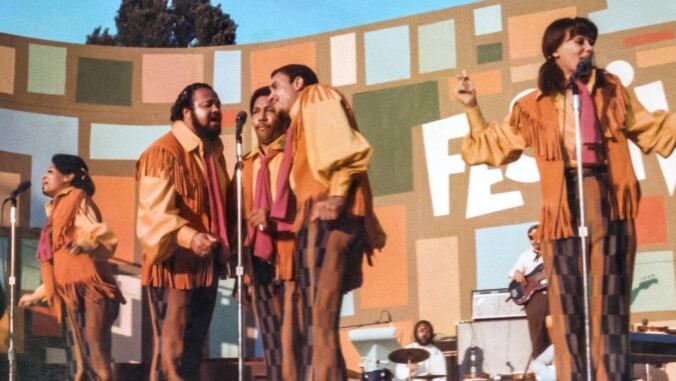On and off stage, Questlove’s Summer Of Soul is an invigorating and inspiring concert film
This rapturous portrait of a Harlem festival gives new life to the music documentary


Everyone has heard of Woodstock. The people who were there have made sure of that. So has the 1970 concert film Woodstock, which won an Academy Award for Best Documentary Feature and was added to the National Film Registry in 1996. But there was another musical event in the summer of 1969 that both reflected and shaped the cultural revolution blossoming around it. This event, the Harlem Cultural Festival, was also captured on film, and attracted some of the biggest names in music at the time. But until archival footage was recently dug up and recut into the new concert film Summer Of Soul (…Or, When The Revolution Could Not Be Televised), the Harlem Cultural Festival mostly lived on in the minds of those who were there.
The reason for this, as Ahmir “Questlove” Thompson’s documentary makes clear, is that the Harlem Cultural Festival was created by and for Black people. A few white faces dotted the stage and the crowd, and the Latinx community of East Harlem was represented as well. But on the whole, the event was designed to channel collective anger about the assassination of civil rights leaders and the burgeoning Black Power movement into a cathartic, celebratory event that affirmed Black attendees’ pride in themselves and their much-maligned neighborhood. The duty—and joy—of recovering this festival of Black culture runs throughout Summer Of Soul, which combines the stories of concertgoers, musicians, and behind-the-scenes personnel with footage of artists like Stevie Wonder, The Staples Singers, Sly And The Family Stone, Nina Simone, Gladys Knight & The Pips, Mahalia Jackson, B.B. King, Hugh Masekela, and Abbey Lincoln and Max Roach—each of them representing a unique part of what was going on in the culture at the time.
Footage from this six-week concert series is, perhaps obviously, an incredible time capsule, particularly when it comes to fashion. From the “suit and tie” look of Motown to the dashikis favored by more radical musicians to the matching collared shirts, bell bottoms, and fringed vests The Fifth Dimension wear on stage, Summer Of Soul blasts the viewer with color and style before a single note is played. And the music itself is electrifying, with goosebump-inducing moments like Jackson and Mavis Staples sharing the mic for a rendition of gospel standard “Take My Hand, Precious Lord” in honor of Martin Luther King Jr., whose last words—“Ben, make sure you play ‘Take My Hand, Precious Lord’ in the meeting tonight. Play it real pretty”—are related to the crowd by the man to whom they were spoken, musician Ben Branch.
Some films would be content to let the quality of this archival footage speak for itself; that was the approach of the 2018 Aretha Franklin documentary Amazing Grace, similarly assembled from previously unseen footage of a legendary performance. And there are times when Thompson doesn’t dare cut away, as when Wonder surrenders to the music and lets his body act as a conduit, jumping in his seat as his fingers dance over the keys. Possession comes up more than once in Summer Of Soul, as interviewees explain how the idea of being taken over by a higher power in moments of divine (or creative) ecstasy traveled from African religions to the Black church and into Black culture more broadly. Even if you’re not a spiritual person, it’s hard to deny that something passes through the crowd when Nina Simone sings.
But where Summer Of Soul really distinguishes itself is in Thompson’s inspired filmmaking. Making his directorial debut, the Roots drummer and frontman approaches this condensed narrative with a musician’s sense of timing, expertly assembling rhythmic montages with editor Joshua Pearson that transcend flashy music-video devices to relay a sense of conversation, of voices reaching across the decades to be heard. Throughout the film, Thompson weaves in stories of what was going on behind the scenes and in the audience during the concerts we watch unfold on stage: In one segment, footage of The Fifth Dimension singing “Aquarius/Let The Sun Shine In” is peppered with shots of a man smiling as he recalls his childhood crush on vocalist Marilyn McCoo. This talking head is intercut with an interview with McCoo herself, talking about The Fifth Dimension’s struggle to fit in with the Black musical scene. Audio of the performance runs continuously underneath these clashing perspectives, a choice that brings the moment to life.
Another recurring refrain in Summer Of Soul is history. On gospel night, emcee and festival organizer Tony Lawrence jokes with the crowd that the profound performance they just witnessed was only “the first 15 minutes” of the Black history being made that evening. Another of Thompson’s favored techniques is best described as modified Errol Morris, where he films his subjects’ faces as they watch footage of themselves from 50-plus years earlier. The tears welling up in their eyes say so much about the emotion evoked by seeing these memories validated on record, more than words ever could. But some try to voice it: One man, for instance, thanks Thompson for “confirmation [that] what I knew is real,” his voice breaking with sadness for what’s been lost and gratitude for what’s been reclaimed. There’s a resignation in the film towards the fact that this footage wasn’t picked up for broadcast back in 1969, but that’s not the dominant feeling that comes across on screen. Instead, we’re immersed in celebration: of a moment, of music, of a people.